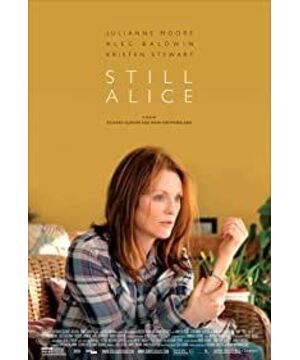A successful woman who has achieved success both in her career and in her family, only to find out in middle age that she has Alzheimer's disease, or dementia. Because of this disease, she gradually lost her career and faced challenges from her family. The film puts people in a moral and ethical dilemma they face in extreme situations, but it is in such a dilemma that she is bravely resisting, videotaping her future self and telling her future self what to do, public speaking , so as to surpass themselves in this tragic environment and prove the meaning of life.
The film can be simply summed up as the story of a successful person who encounters the plight of life and becomes a loser. The most moving part is the sense of reality of the film. Alice feels the smallness of her own strength and cannot resist the horror of disease. She struggled to resist. The film culminates with Alice's public speech, "But I still have moments in the day of pure happiness and joy. And please do not think that I am suffering, I am not suffering. I am struggling, struggling to be a part of things , to stay connected to who I once was. So living in the moment I tell myself. I thought the film would end here, but the story continues, Alice gradually loses her memory, and her daughter reads it to her and asks her what the theme is. She has lost her mind, and she just said "love". She has a strong sense of reality. Even if she struggles hard, she will eventually be defeated by the disease. In this sense, Alice seems to be reduced to a loser again, but as long as she uses Love to give, be grateful and fight, then you will not lose yourself.
View more about Still Alice reviews











